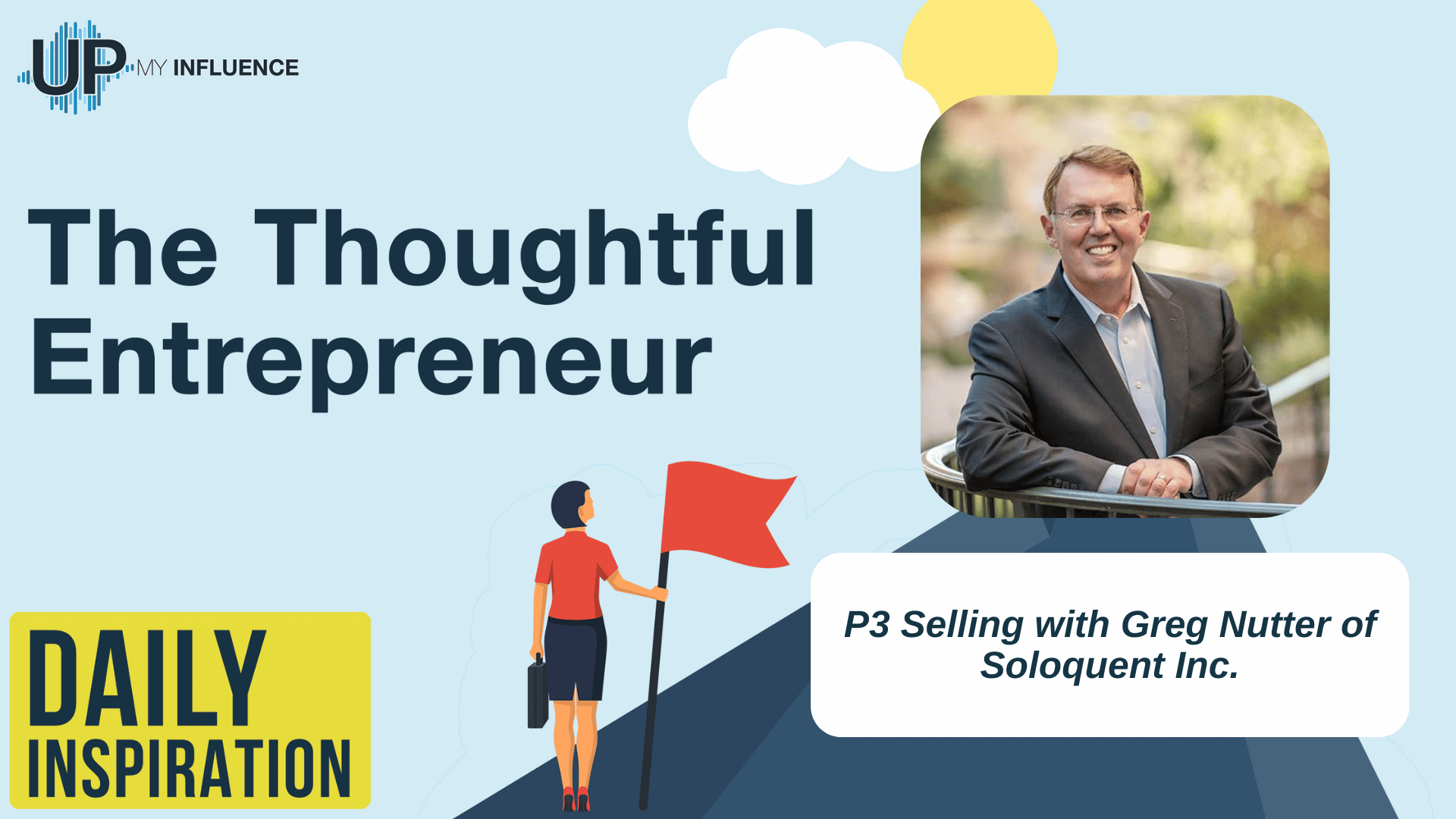THE THOUGHTFUL ENTREPRENEUR PODCAST
In this episode of the Thoughtful Entrepreneur, your host Josh Elledge speaks with the President and Founder of Soloquent Inc.,Greg Nutter.

Greg Nutter, a seasoned management consultant and the founder of Soloquent, is also the author of “P3 Selling: The Essentials of B2B Sales Success.” The discussion explored the complexities of B2B sales, common mistakes to avoid, and practical strategies for elevating a business.
Greg’s expertise is in helping small and medium-sized enterprises (SMEs) enhance their revenue performance. He works closely with owners and business leaders, who often need more sales expertise, to improve their sales capabilities and expand their businesses. His approach is hands-on and customized to address each company’s specific challenges.
Greg pointed out a standard error in B2B sales: the tendency to prioritize a sales-centric approach over a buyer-centric one. Many sellers erroneously concentrate on product features and completing the sale instead of solving the client’s problems and seizing opportunities. He stressed the importance of understanding the client’s needs before making a product pitch.
His book, “P3 Selling: The Essentials of B2B Sales Success,” is well-regarded for its practical insights into the B2B sales process. Greg’s consulting experience includes working with industry giants like Microsoft, SAP, and Michelin, as well as smaller, specialized firms. His extensive expertise demonstrates that practical B2B selling skills are crucial, regardless of one’s role in influencing decisions.
Key Points from the Episode:
- Overview of P3 selling methodology
- Fundamentals of P3 selling
- Common mistakes in B2B sales
- Greg's consulting experience and clients
- Consulting approach and services offered by Soloquent
- Recommendations for business owners and entrepreneurs
About Greg Nutter:
Greg Nutter is the president and founder of Soloquent, Inc., specializing in assisting business owners and senior sales executives with revenue growth challenges. His company provides targeted solutions that enhance sales performance through strategic consulting and innovative sales training methods. He is also the acclaimed author of “P3 Selling: The Essentials of B2B Sales Success” a comprehensive B2B sales and sales management guide designed to help sales professionals excel in today's complex selling environment.
With over thirty-five years of experience, Greg has coached over 1,000 sales professionals. His expertise is frequently sought for executive briefings, workshops, and global keynote speeches. His approach is centered on practical, real-world applications of sales theories to drive performance improvement across various industries and markets. This experience has enabled him to contribute significantly to the sales strategies of numerous multinational corporations.
About Soloquent Inc.:
Soloquent Inc. is a management consulting firm dedicated to helping CEOs and business owners tackle challenges associated with revenue growth. The firm primarily serves small to mid-sized companies engaged in consultative selling through direct, indirect, or multi-channel sales approaches. Soloquent addresses common issues such as anemic growth, market expansion struggles, high staff turnover, and ineffective sales and marketing investment returns.
The company distinguishes itself through a diverse team of highly skilled consultants who bring a wealth of experience from large corporations and start-ups. Soloquent's comprehensive services include situational analysis, refinement of sales strategies, and development of sales tools and processes. The firm offers hands-on execution support to implement strategic plans effectively. This holistic approach allows Soloquent to deliver tailored solutions that enhance organizations' sales performance and overall efficiency across various sectors, including manufacturing, technology, and services.
Tweetable Moments:
08:01 – “Prospecting is not selling; it's marketing.”
Links Mentioned in this Episode:
Want to learn more? Check out Soloquent Inc. at
Check out Soloquent Inc. on LinkedIn at
https://www.linkedin.com/company/soloquent-inc./
Check out Greg Nutter on LinkedIn at
https://www.linkedin.com/in/greg-nutter/
Check out Greg Nutter’s book, “P3 Selling: The Essentials of B2B Sales Success” at
https://www.amazon.com/P3-Selling-Essentials-Sales-Success/dp/154452997X
More from UpMyInfluence:
We are actively booking guests for our The Thoughtful Entrepreneur. Schedule HERE.
Are you a 6-figure consultant? I’ve got high-level intros for you. Learn more here.
What is your #1 Lead Generation BLOCKER? Take my free quiz here.
Want to learn more about all the podcasts managed by UpMyInfluence? Opt in here.

